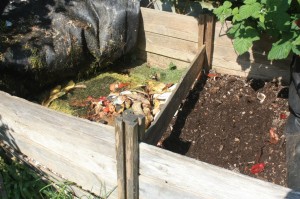A compost pit is a necessary part of any smallholder farming operation because it brings many benefits to the farm without costing a lot of money and labor. Adding compost to your soil helps it to retain nutrients; it helps balance the pH of the soil, makes cultivation easier, prevents soil erosion and controls the proliferation of weeds in the soil. In most African countries, the majority of farmers are smallholders who would benefit greatly from a simple but very helpful thing like a compost heap.
- Pick a good spot
Select a shaded spot and mark out a square 3 feet long and 3 feet wide. Dig a 3 foot pit in the area you have marked out. Keep the removed soil nearby where it can be easily added later. All stones, roots and any other waste or rubble must be removed from the soil. The compost pit should be at the edge of the garden where there will be no need to dig up the compost and transport it. Watch out for any underground utility lines and do not put it next to your neighbor’s compound or next to the road. The best tool to use for digging up is a shovel.
- Layering
For every layer of organic matter – twigs etc – should be covered by a layer of dried leaves or soil. This allows air to enter the pit and keeps it from stinking up your garden. A third layer can be manure. After adding organic matter, add dried leaves and then add fertilizer and then repeat the process. If you have too much material to compost, you can always dig more than one compost pit. Adding fresh material to a compost pit that is already in the process of composting will only delay the process of preparing. Don’t use any material that has been recently sprayed with chemicals such as pesticides.
- Bugs are your friend
No need to spend time removing worms and bugs from your compost pit. In fact, you may even want to add worms to the compost pit. Worms speed up the breakdown of waste and add their own excreta to further enrich the compost. You can also add lime or manure to make the decomposition process faster.
- Turn it around
Turn your compost heap every two weeks to make sure that the process is faster. Every time you turn the compost over, add a little of the soil that was dug out of the pit into the compost. When the compost seems dry; sprinkle water on it. Use a pitchfork to turn the compost around.
- Protect your Compost Pit
When it rains, protect your compost from getting carried away or otherwise damaged. Cover it with a black plastic and hold down the plastic using bricks or stones. The covering also makes the compost warm making it easier for the compost to decompose faster.

This is very educative. Keep it up.